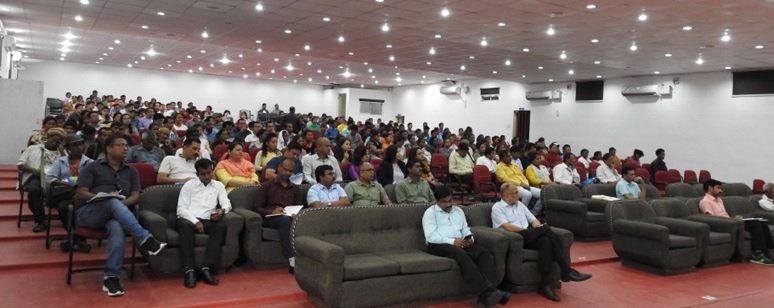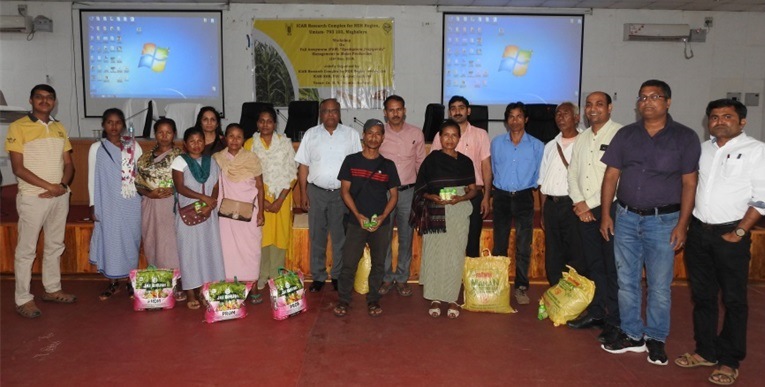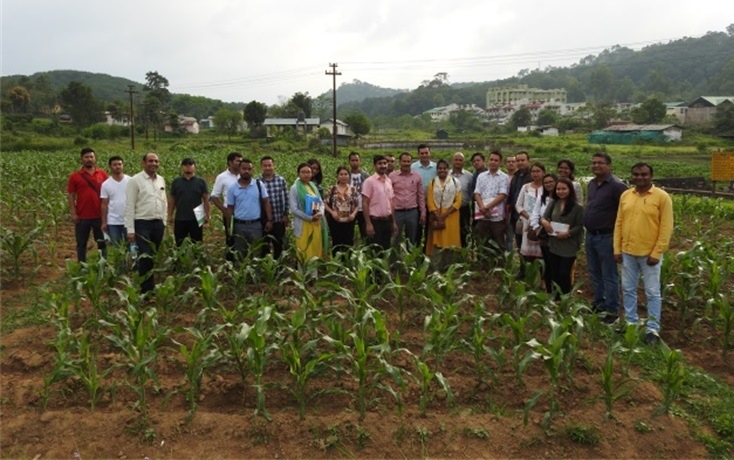National workshop on “Fall armyworm management in maize production” at Umiam on 28th May, 2019
Maize is the second most important crop of the Meghalaya and recently, maize production is under threat from a new invasive pest, the Fall Armyworm (FAW, Spodoptera frugiperda (Lepidoptera, Noctuidae) reported in the North Eastern States in April 2019. This pest was reported in the Meghalaya from West Jaintiya Hills in May 2019 and covered almost all the districts in very short span of time. Advisories were issued by ICAR to the state government for immediate action for FAW management.
To address the farmer’s requirement for management of Fall Armyworm and to give practical training and know-how to stakeholders, a one day National Workshop on “Management of Fall Armyworm in the Maize Production” was organized jointly by ICAR-RC-NEH Region, Meghalaya and ICAR-Indian Institute of Maize Research (IIMR), Ludhiana, Punjab on 28 May, 2019 at Umiam. This workshop was held under collaborative programme for promotion of maize in NEH region.
Shri Aiban Swer, Director, Meghalaya Basin Development Authority, Govt. of Meghalaya, in his inaugural address appreciated the initiative of ICAR, Research Complex Umiam and IIMR to bring all the stakeholders together in order to create the preparedness to tackle the menace of FAW at the state level. He also stressed that maize productivity is low in the state compared to national productivity and requested state officials, ATMA, KVK scientists, and farmers to work together in ICAR collaboration to tackle the FAW.
Dr. Narendra Prakash, Director and Dr G.T. Behere, Head Crop Protection, Dr Subhash Babu, Scientist, ICAR-RC-NEH Region, Umiam; Dr. N. Chaudhary, Deputy Director, Directorate of Plant Protection, Quarantine & Storage, Faridabad; Dr Anoop Kumar and Dr Mukesh K. Khokhar of ICAR-NCIPM, New Delhi, Dr SB Suby of ICAR-IIMR and Dr. S. L. Jat, Coordinator IIMR-NEH Maize programme also attended the inaugural programme. Dignitaries highlighted the threat posed by this invasive pest and called for effective strategies to manage this pest so that farmers could realise high economic returns from the maize cultivation considering the organic input in crop production. Importance of use of bio-pesticides and natural enemies in the control of FAW was emphasized. A technical bulletin on maize production technology in Meghalaya was also released during the workshop. Organic inputs includingneem based pesticide formulation and organic manures were distributed to the farmers during this programme.
Detailed technical sessions and Farmers’ Scientists’ interaction were also organized with emphasis on management of Fall Armyworm menace in the Meghalaya and ways to protect the crops from it. The identification and scouting with non-chemical control measures were discussed in Vernacular and English languages. The measures taken by the Mizoram and Manipur governments were shared with the participants. The regular monitoring using pheromone trap, scouting, biopesticides input availability/distribution and formation of rapid response team were emphasized for FAW management in Meghalaya.
For practical exposure, field visit was also held at the ICAR research farm and key aspect of symptomatology, pest identification, scouting, targeted application of the biopesticides/sand/bio-agent and recording of the secondary infestation for effective management strategy were discussed. Around 300 farmers from different districts, 55 state officials from line departments of Meghalaya and 40 Scientists and Subject Matter Specialist of ICAR and KVK participated in the workshop.
Dr. Subhash Babu Scientist (Agronomy) was the organizing secretary and Drs Amit Kumar, Bagish Kumar, D.M. Firake and Jayanta Layek were the co-organizing secretary of the workshop.



